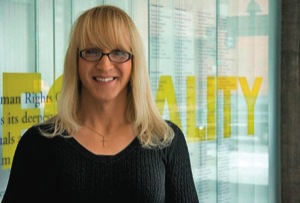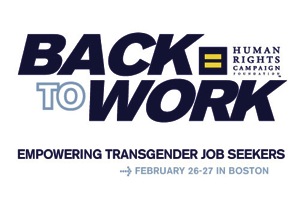
Sometimes, it’s the right people, at the right place, at the right time that creates positive change. My friend Allyson Robinson, who is the Associate Director of Diversity at the Human Rights Campaign (HRC), is one such person. Sharon Skipper, the CEO of the for-profit firm LGBT Career Assistance, and the CEO of the non-profit firm the Foundation for New Beginnings, is another such person. Allyson and Sharon have teamed up with HRC to develop a project entitled, Back to Work; Empowering Transgender Job Seekers. HRC describes the Back to Work project in this way:
Transgender Americans are highly employable job candidates. But they need superior, specialized job-hunting skills to help overcome hiring biases.
HRC’s Back to Work project empowers transgender Ameri-cans who are unemployed, or underemployed, to find jobs that match their unique expertise and experience, providing them with essential skills to make the most of the job market and get back to work.
The inaugural event of its Back to Work project is in Boston on February 26-27, 2011. Seventy five to eighty five people will receive training in a classroom setting, and the first thirty who enroll in the class will receive individual assistance from Sharon Skipper. If this program was being offered by a for-profit business, it would be a six figure program. The transgender job-seekers who receive the group training and the individual counseling will be receiving it at no cost.
Despite a press release for this project, and information on HRC’s webpage, there are questions about how this project was conceived and why Boston was the city selected for the inaugural training. In addition, many are asking whether there will be additional cities where the program will be offered.
Well, part of the answer is found within Allyson’s back story. Allyson’s father performed the same kind of work as Sharon Skipper. He was a specialist in training job seekers with skills to find better jobs, and ultimately to help them find better jobs faster. In other words, Allyson knew the value of superior, specialized job-hunting skills, because she has a family history that taught her the value of training.
Allyson is a West Point graduate, a Patriot Missile Battery Officer, a seminary graduate and an ordained American Baptist Minister, who has been a pastor at a couple of churches. My friend Allyson seems to be a person who is filled with a lot of heart, and really has that military leadership quality of knowing how to get things done.

Allyson is also transgender. When HRC was looking to add a transgender staffer back in 2008, she was the one they hired.
Given that employment is a huge issue for transgender community members, Allyson has been formulating ideas for HRC to develop a job-hunting program for transgender job seekers. It would not only provide those superior specialized job-hunting skills that transgender people need, but it would also help transgender people address issues that other job-seekers don’t have to deal with. Issues such as using a name that isn’t legal yet, or having references that recognize the job seeker by a name and gender that doesn’t match the name and gender supplied on the job application.
In late spring of 2009, Sharon Skipper presented ideas that she had for a pilot project to teach unemployed or underemployed transgender people. Skipper said the purpose of the program was, “To find jobs that match their expertise and experience by providing them with essential skills needed to make the most of the job market.” Sharon’s and Allyson’s ideas were parallel ideas, and the Back to Work project was conceived.
HRC got behind this project and resources were spent ironing out the details. Funding was allocated so that the Back to Work project could be rolled out as a pilot project in three to four cities.
This past week, when I asked Allyson why Boston was chosen to be the inaugural city, she told me that it was because the city has a large, visible transgender community, and Boston has a cluster of employers that have a 100% rating on HRC’s Corporate Equality Index.
For those who aren’t aware, HRC releases a report each fall that provides an in-depth analysis and rating of large U.S. employers based upon their policies and practices with respect to lesbian, gay, bisexual and transgender employees. This report is called the Corporate Equality Index or CEI. To obtain a 100% CEI rating, a U.S. employer must have an anti-discrimination policy that includes gender identity and expression.
In 2012, the CEI will require U.S. employers to provide transgender specific healthcare benefits in order to receive a 100% rating. Those employers achieving a 100% CEI rating have a commitment to equality of opportunity for their transgender employees.
With Boston having a cluster of employers with a 100% CEI rating, and a large population of transgender members, it made sense to hold the training there first.
A secondary benefit of having the training in Boston is the ability of HRC, the Massachusetts Transgender Political Coalition (MTPC), the Bos-ton Alliance of Gay, Lesbian, Bisexual, and Transgender Youth (BAGLY), the AIDS Action Com-mittee of Massachu-setts (AAC) and MassEquality to point out that Massachusetts doesn’t have an antidiscrimination law that protects people based on gender identity and expression.

There is money for the Back to Work project to be held in two or three more cities after Boston.
It is fantastic news to see that dozens of transgender job-seekers will be helped in Boston, and dozens, or hundreds more will be helped in the first phase of the Back to Work project. Allyson is already talking about future plans for a second phase of this project that will be based upon the anticipated success of this first phase.
This project speaks volumes about Allyson Robinson and her peers at HRC, as well as HRC’s commitment to the transgender community. I truly believe that without Allyson at the helm, with her personal history and vision, this project by the HRC wouldn’t have got off the ground. The transgender community is perhaps just lucky that Allyson is in the right place, at the right time, to help make this project succeed. But lucky or not, my transgender peers and I are extremely blessed to have Allyson as one of our community activists.











